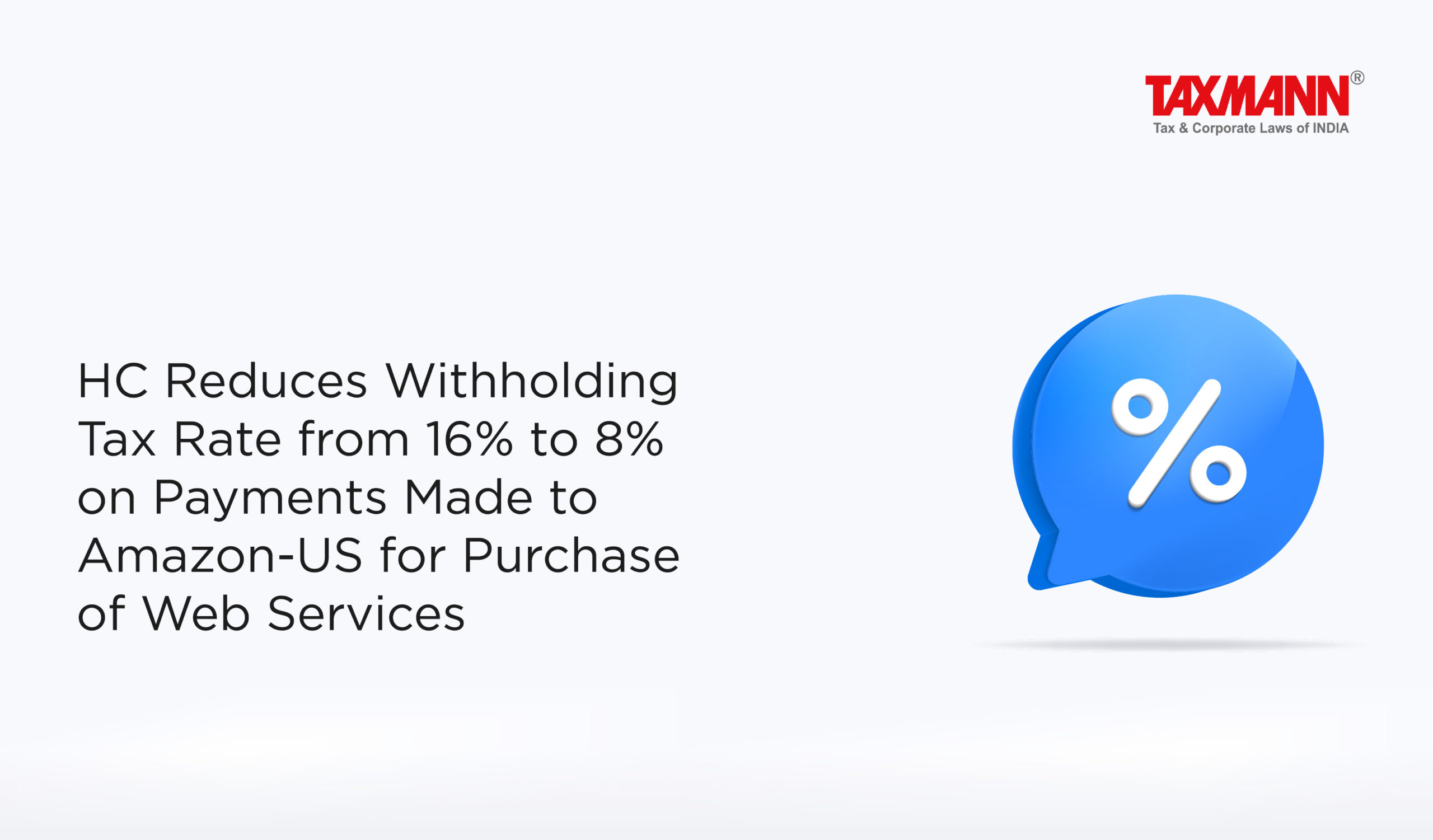HC Reduces Withholding Tax Rate from 16% to 8% on Payments Made to Amazon-US for Purchase of Web Services
- News|Blog|International Tax|
- 2 Min Read
- By Taxmann
- |
- Last Updated on 13 September, 2023

Case Details: Amazon Web Services India (P.) Ltd. v. Income Tax Officer - [2023] 154 taxmann.com 230 (Delhi)
Judiciary and Counsel Details
-
- Vibhu Bakhru & Amit Mahajan, JJ.
- Porus Kaka, Sr. Adv., Rohit Jain, Aniket D. Agrawal, Samarth Chaudhari & Manish Kanth, Advs. for the Petitioner.
- N Venkataraman, ASG, Ruchir Bhatia, Adv. for the Respondent.
Facts of the Case
Amazon Web Services (AWS) USA was a company having principal place of business in the United States of America. It was engaged in providing web services to its customers and resellers worldwide, including AWS India. Assessee-AWS India was involved in reselling web services to third-party customers in India.
As per the reseller agreement between the two entities, AWS India was authorized to resell web services to its customers in India and make payments to AWS USA to purchase web services. AWS India contended that AWS USA does not own, lease or operate any data centres in India, therefore not having any permanent establishment in India. However, receipts were chargeable to the Equalisation Levy.
The assessee applied for a certificate for nil withholding of tax on reseller fees. However, the Assessing Officer (AO) proceeded on the information available in the public domain and concluded that AWS USA had significant infrastructural assets (data centres) in India, constituting its PE.
Thus, reseller fees paid by AWS India to AWS USA would fall outside the scope of the Equalisation Levy and would be chargeable as business income under the provisions of the Act. Accordingly, AO directed the assessee to withhold 16% of the remittance on account of the reseller fee paid to AWS USA. Aggrieved by the order, the assessee filed a writ petition to the Delhi High Court.
High Court Held
The Court held that AO’s stand that AWS USA has PE in India was contentious. However, even if it is assumed that the data centres in India are owned or operated by AWS USA, AO failed to determine the proportion of income attributable to the PE in accordance with Indo-US DTAA.
It can’t be accepted that the entire amount payable by AWS India to AWS USA can be considered revenue attributable to AWS’s PE (if any) in India and that no part of it is attributable to overseas entities. The exercise conducted by the AO of determining the revenue attributable to a PE, which also requires allowance for the deduction of material expenses to be made, is flawed.
The proceedings under Section 195(2) only determine the proportion of income chargeable to tax for the limited purpose of determining tax withholding. The determination under Section 195(2) does not constrain the revenue from correctly assessing the payee’s income chargeable to tax per the law. AO was correct that the assessee had not provided AWS USA’s financial information for the preceding years, which may be essential in determining the application under Section 195(2).
Considering that the nature of these proceedings was confined to withholding of tax and that the financial year 2022-23 was already over, this Court had suggested to the parties that without prejudice to their rights and contentions regarding the chargeability of AWS USA’s income under the Act, a total of 10% be withheld (less 2% Equalisation Levy that has already been paid) as withholding tax.
Disclaimer: The content/information published on the website is only for general information of the user and shall not be construed as legal advice. While the Taxmann has exercised reasonable efforts to ensure the veracity of information/content published, Taxmann shall be under no liability in any manner whatsoever for incorrect information, if any.

Taxmann Publications has a dedicated in-house Research & Editorial Team. This team consists of a team of Chartered Accountants, Company Secretaries, and Lawyers. This team works under the guidance and supervision of editor-in-chief Mr Rakesh Bhargava.
The Research and Editorial Team is responsible for developing reliable and accurate content for the readers. The team follows the six-sigma approach to achieve the benchmark of zero error in its publications and research platforms. The team ensures that the following publication guidelines are thoroughly followed while developing the content:
- The statutory material is obtained only from the authorized and reliable sources
- All the latest developments in the judicial and legislative fields are covered
- Prepare the analytical write-ups on current, controversial, and important issues to help the readers to understand the concept and its implications
- Every content published by Taxmann is complete, accurate and lucid
- All evidence-based statements are supported with proper reference to Section, Circular No., Notification No. or citations
- The golden rules of grammar, style and consistency are thoroughly followed
- Font and size that’s easy to read and remain consistent across all imprint and digital publications are applied



 CA | CS | CMA
CA | CS | CMA
